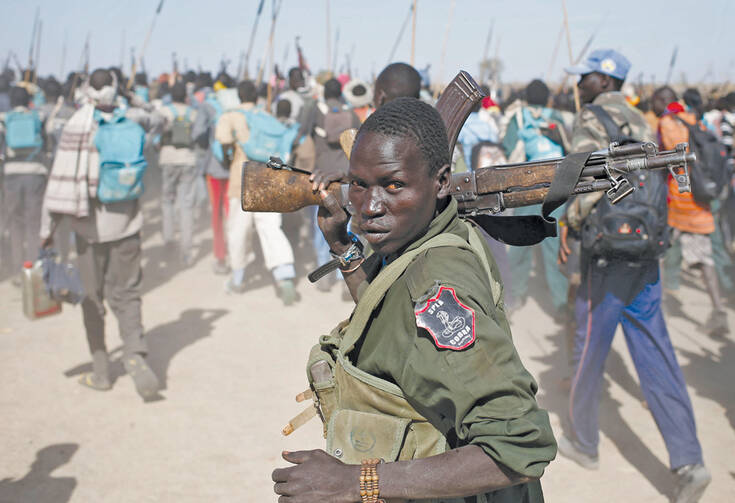A cease-fire that seemed to offer a chance for a peaceful resolution to months-long conflict in the world’s newest nation, South Sudan, has unraveled. Intermittent fighting has continued since the cease-fire agreement was signed on Jan. 23. But now in Malakal, a key city in an oil-producing region in the country’s northeast, government forces loyal to President Salva Kiir are in more or less open combat with rebel groups loosely arrayed behind former Vice President Riek Machar.
Sudan’s Catholic bishops complained in early February that they could have a stronger role in ending the violence but have been left out of the peace process, as have representatives from South Sudan’s civil society. Now negotiations in Ethiopia to unravel the conflict are at a standstill, and Malakal, a city of 150,000, has been reduced to a “ghost town,” according to Llanos Ortiz, deputy emergency manager for Médecins Sans Frontières (M.S.F.-“Doctors Without Borders”). Ortiz has recently returned to Barcelona but receives daily updates from her team in South Sudan. She told America that the news from Malakal is not good.
An M.S.F. emergency coordinator reports that the city is deserted, “with houses burned throughout and countless dead bodies strewn in the streets.” Ortiz said most of the residents of the city have “been obliged to flee.” Many are seeking safety on the opposite side of the Nile River in camps that have also proved vulnerable to attacks from armed groups.
Ortiz said that M.S.F. medical compounds have not been spared, neither in Malakal nor in other South Sudanese cities where violence has reignited. On Feb. 22, an M.S.F. team came upon “scenes of horror,” discovering at least 14 bodies throughout the Malakal Teaching Hospital compound, scattered among 50 to 75 patients remaining in the facility who were too weak or elderly to flee for safety. Ortiz could not say which side attacked the facility. “There have been [repeated] attacks and counterattacks from both sides,” she explained. Many buildings in the hospital were damaged, the pediatrics ward was razed, and equipment was looted.
New York-based Human Rights Watch accused both sides of serious abuses that may amount to war crimes. “A clear pattern of reprisal killings based on ethnicity, massive destruction, and widespread looting has emerged in this conflict,” Human Rights Watch said in a report released on Feb. 27.
Survivors reported that armed groups entered the hospital on Feb. 19 and shot dead people who had no money or mobile phones to hand over. Later that afternoon, armed men returned and killed patients in their beds and others who had fled to the operating theater for safety. They also reportedly raped women and young girls.
According to Ortiz, those who have fled the city remain in an extremely precarious condition in a number of camps for displaced people that have sprung up in the area. Access to food, sanitation and water is an immediate concern. Ortiz said she is especially concerned about the near term in the area, as the South Sudanese rainy season is about to begin. Typically the area becomes more or less inaccessible because of the rains, and it may be difficult to reach people cut off in the camps. Their vulnerability to disease, hunger and violence will only increase in the coming weeks, she warned.
The international anti-poverty agency Oxfam pulled its staff out of Malakal because of the dangerous conditions. Ortiz said that M.S.F. has no intention of leaving. “No way; absolutely not,” she said. Right now, she said, the group has the capacity to assist Malakal residents who have fled the city, and M.S.F. has re-established a camp hospital to treat the wounded who continue to trickle in seeking help. But, she said, the volatile situation really “requires a very comprehensive response by the international community.” The U.N. reports that after three months of conflict more than 860,000 people have been driven from their homes in South Sudan.








